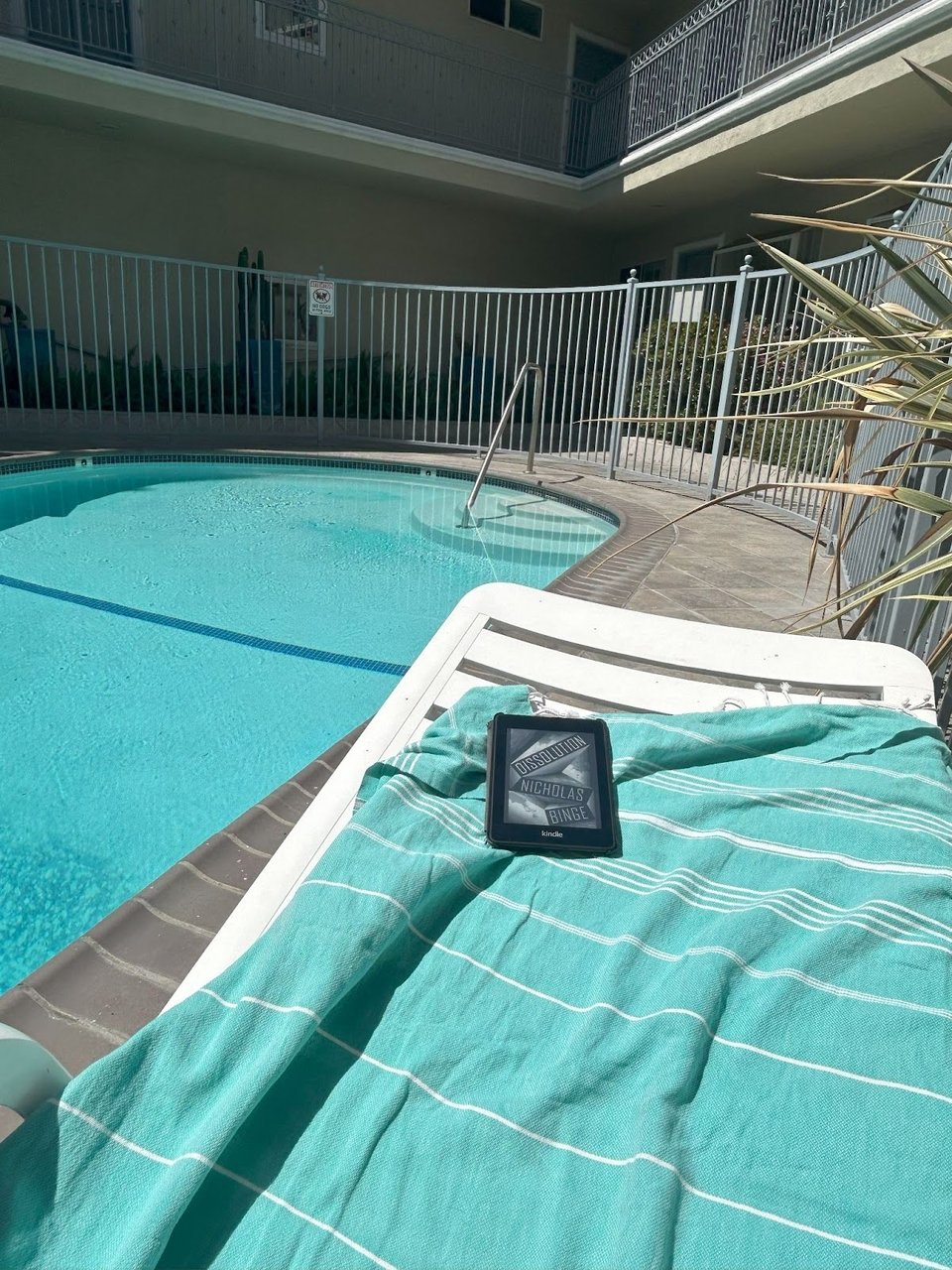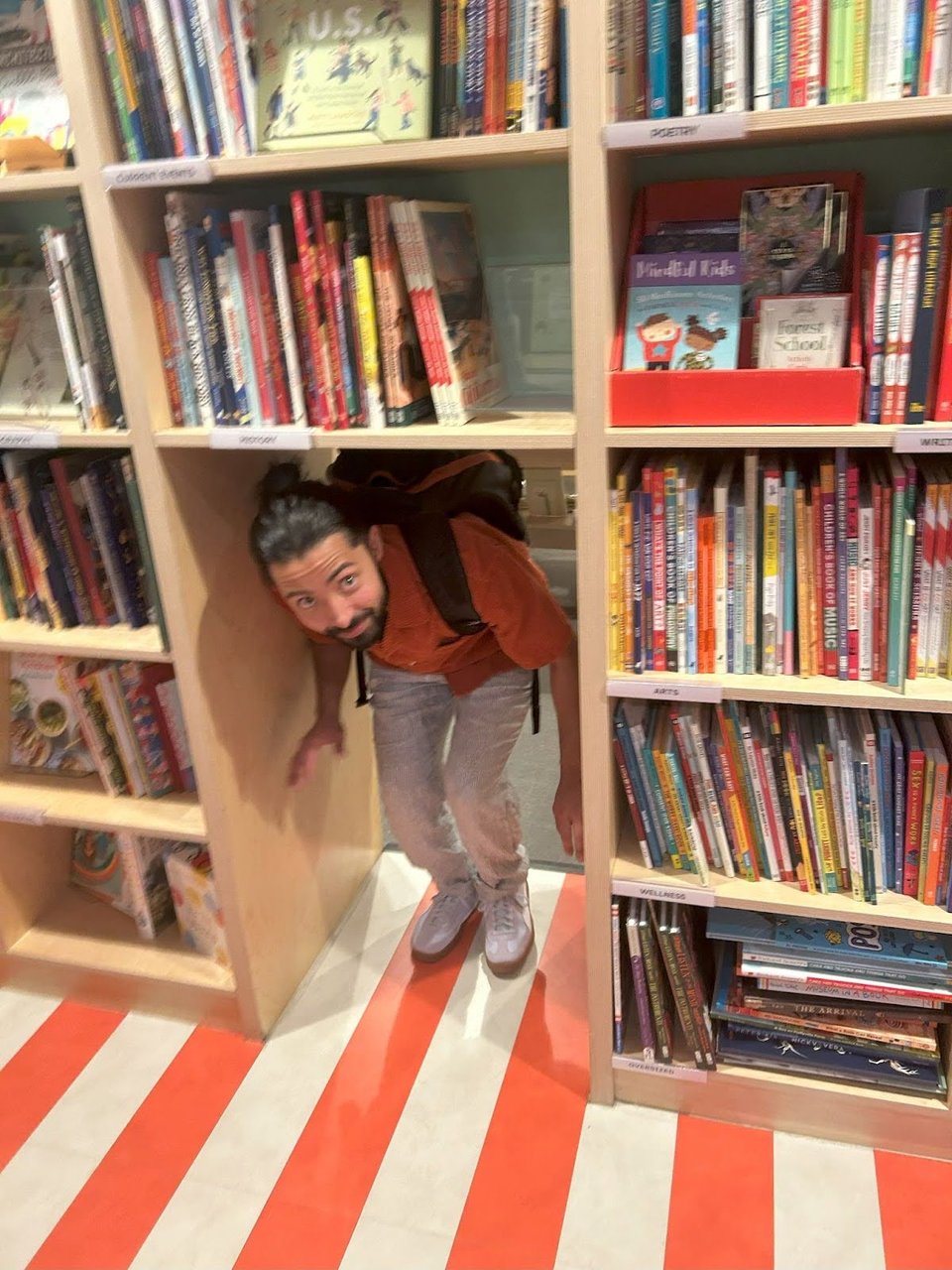April 4th: Natalie Balderas-Fowler
I. Introduction
April 4, 2025. You may be expecting a poet. Or a creative writer. Or an artist. You are definitely not expecting a lawyer. A government lawyer at that. Dare I say, a bureaucrat?
I had anxiety about joining this project. I went back and forth on it. They don’t want to hear from a lawyer. Some may say being a lawyer is the opposite of creativity. I don’t want to admit how much time I spend scouring The Bluebook to make sure my case and statute citations are correct, that the proper terms are in italics, that the parentheses and brackets are accurate, and in what situations I should be using four instead of three ellipses.
Yet, I find myself frequently in positions to think more creatively. When conducting fact-finding – knowing where to look, what questions to ask, what types of evidence to gather– I have to think out of the box in order to determine what happened. Then, once you have all the facts, you turn to the legal research. Statutory interpretation always starts with the plain language of the statute. Okay, that seems straightforward. But, what happens when the statute is ambiguous? What happens when there is no binding precedent? Then, you turn to legislative intent, legislative history, reasonableness, public policy, and more. An opportunity is created to take the facts of the particular situation and determine if they fit within the law. If they do, it’s time to frame your narrative. Depending on your job, this could be legal briefs, opening and closing arguments, etc. An attorney’s role is to shape and present the facts in a way that clearly fits within the law, but while you are doing so you are story telling. This is why so many lawyers have backgrounds as English Literature majors, performing arts and theater, or speech and debate in high school. You must make a strong, plausible argument that fits squarely within the law. But within those confines, there is so much room for creative interpretation and unique approaches. In fact, many of our laws and protections have been expanded over time through this nature.
Maybe by framing this field as unfit for creativity, those in power are preserving the current system to prevent any sort of evolution. Our country is in a crisis. There are active threats to democracy, civil rights, free speech, etc. Like many others, I am scared. I do not know the way out. But, maybe creativity is hope.
II. A Day In The Life
6:30 a.m. Alarm goes off. I unlock my phone and delete the alarm entirely. Again. I haven’t gotten out of bed at the time I planned to in a month. I’ve been blaming it on daylight savings, but how long can I keep that act up?
7:45 a.m. Okay. Okay. I’m awake. But of course I’ve been scrolling through my phone.
8:00 a.m. Finally! I am really awake this time. The day is mine. The sun is shining. It’s a new day. I’m feeling good, wearing my oversized Roots sweatshirt and red flannel pajama pants, making my morning coffee in my $25 Mr. Coffee maker. We have a nice espresso machine, which I love, but I still find myself making a huge pot of Mr. Coffee most days anyways. There’s something about mediocre coffee coming from a cheap coffee pot that I have to descale with a vinegar rinse every 3 months to preserve it that makes me feel alive when I take that first sip.

Okay, I’m out of bed, drinking coffee, eating breakfast, and ready to tackle my day. My husband is taking the dogs outside to go potty. Wait, what’s that wet feeling on my foot? It’s dog pee. As I clean it up with an overpriced enzymatic cleaning spray, I remind myself again to buy a new rug.
8:30 a.m. I start to work at my cozy work-from-home setup. I adore my job. It excites me. I feel like I am really helping people and making a difference. I adore working from home. My dogs cuddle in my lap while I work. I go for walks in my neighborhood during breaks, and I have an endless supply of coffee and snacks in my kitchen.
10:00 a.m. I get so focused on working that my coffee goes cold. Time to microwave it. How many times will I do this today?

Working from home is not distraction-free. Watson (11-month- old Pitbull mix puppy, 42 pounds) is trying to chew on Dobby’s legs again (5-year-old Italian Greyhound mix, 10 pounds). I yell from my desk, “Stop chewing on your brother’s legs!!”
A few minutes later, Watson grabs my tennis shoes from the shoe rack and makes a run for it. My husband Roberto swoops in to save them just in time. We are keeping a close watch. While I was working yesterday, Watson chewed a hole through a blanket Roberto got me for our first wedding anniversary. He had our vows printed on it. I cried because I was so upset, and then five minutes later I found myself snuggling the puppy again, giving him kisses. I’m a sucker.
12:00 p.m. Lunch break! I would typically walk the dogs, but we can’t walk Watson until the wounds on his paws have healed. Instead, I have a few minutes to lay by the pool and read. We live in one of those classic, old Los Angeles apartments. It was built in 1961 (rent controlled!), with a center courtyard where every door faces the pool in the middle. The water is heated, and it’s 68 degrees outside. Spring in Los Angeles is magical. There's excitement in the air as people flock to the beach, picnic in the park, and rollerblade between Santa Monica and Venice with the smell of sunscreen and salty ocean water permeating through the air.

Today though, I’m working. But I’ll take ten minutes by the pool to read a chapter of my new book, Dissolution by Nicholas Binge. (High-level overview: a woman has spent the last decade caring for her husband with memory loss. A stranger tells her that it’s not dementia, but someone is actively removing the memories to hide a secret. It’s described as a “techno-thriller.”) I’ve just started the book, but a quote in Chapter 1 is sticking with me:
“It occurs to me at some point, you pick up your child for the very last time. And you don’t know. At the time, you don’t know that it’s the last time you’ll ever do it.… Endings don’t announce themselves. They sneak around you; they shuffle their way past unnoticed until, on some cloudy day, you look out on an empty street and realize everything ended some time ago.”
I’ve been thinking a lot about the in-betweens. I haven’t lived in the same apartment for more than two years since I was 18 years old, so I am no stranger to moving or big life changes. Sometimes I think I crave the chaos of big life changes. I’m not sure I know how to survive in the calm periods between transitions. I often seek out major changes when things settle down. (Hence, adopting Dobby in my first month of law school during a global pandemic; moving across the state right after taking the Bar Exam; adopting another puppy before my husband’s last year of graduate school; etc.) The truth is, I am accustomed to chaos. It motivates me. But right now, I’m in an in-between period. Things are calm. We are planning a big transition moving to our hometown by the end of the year – but for now, it’s just us, the dogs, and our daily routine. I am trying to use this time to get to know myself. Who am I when I am not running the rat race? Who am I when I am not working to get into college, then to get into law school, then to pass the Bar? Who am I, separate from all the external factors and influences?
At some point, I’ll be having my last morning coffee while working from my little apartment. I’ll be watching my last LA sunset. I’ll be watching the Metro go by from my bedroom window for the last time. I’ll be pissed off in LA traffic for the last time. I’ll go for my last walk at the beach after work, and have my last bowl of ramen at Killer Noodle. So for now, I’ll just let myself be. I will exist in the in-between.
1:00 p.m. I microwave my coffee, because it’s gone cold, again, and go back to work.
III. An Evening in the Life
5:30 pm. After work, I drive to campus to pick up Roberto after teaching his first class of spring quarter. He fills me in on all the details as I drive to our date night. We eat breakfast tacos for dinner at a tex-mex place called HomeState. The cheese skirt on the potato taco is mouth watering. The flour tortillas are made on-site. “Next time,” I declare, “I am ordering a side of potatoes,” as I eye the man’s plate at the table next to me.
I realize I left my phone in the car, so we run back to get it then wander into one of our favorite bookstore coffee shops, Village Well. We spend half an hour meandering through the aisles, adding new titles to our TBR lists. We each separately find a book we want to read, and it turns out they are the first and second books in the same series. I think that describes us.

We reflect that the name “Village Well” is fitting for a third space like this where people come for nourishment. In addition to being a bookstore, they sell food, coffee, wine, tea, and the wares of local artists and vendors. Each section of books has a little sign that tells you what kind of coffee or tea pairs well with the genre of books. We wander into the children’s section, where they have bi-weekly story time events, and there’s a little hole in the bookshelf for kids to enter the area as if they’re entering a magical world. Of course, Roberto enters that way.
We walk over to Salt and Straw for dessert. I order Sea Salt with Caramel Ribbons, and Roberto orders Chocolate Malted Potato Chip Cupcake – an affront to humanity. We sit on the steps and people-watch. There’s an old hotel across the way. Roberto asks, “What’s its story?” Maybe it’s a John Wick-esque hotel. Or maybe, he wonders, a century ago wealthy men would bring their escorts there, and now the ghosts of the deceased escorts haunt the wealthy clientele that come in that are the descendents of the men who abused them. I loved hearing him utilize his creativity, take a simple scene and create a fictional world within it. I felt myself longing to be able to use my mind in that way. I want to look at a hotel and see a long history with an exciting revenge plot. I want to look at a children’s section at the bookstore and see a magical world. I want to enter through the hole in the bookshelf as Roberto did, instead of admiring from the sideline while entering the room the normal, expected way. I used to have endless fantasies as a child, creating new worlds every day. When did I stop? Just like the Dissolution quote, I guess one day I played pretend for the last time without realizing it. The end of my imagination snuck up on me. But is it truly gone? How can I get it back?
8:30 pm. I’m ready to go home. I need to be on the couch, in my oversized Roots sweater, cuddling my dogs, underneath at least three blankets. We walk back to the car, and Roberto asks me if I could have any superpower, what I would pick. We decide the top three are teleportation, summoning any items, and a save-state you can go back to at any time. I found myself getting into the hypothetical – thinking about what I would do if I acquired powers, the moral implications, the impact it would have on my life, and who I would let in on the secret. For a brief moment, I found myself getting lost in the idea. Is this it? Is this what it feels like to be creative?
That lasts about ten minutes until my brain spirals thinking about the tariffs, a potential recession, and how I should save money.
We head home and watch the Season 3 finale of Netflix’s Love on the Spectrum. And yes, I am on the couch, in my oversized Roots sweater, cuddling my dogs, underneath three blankets. We watch with tears in our eyes as Abbey sings the song she wrote for David. “My Prince Charming doesn’t bring me flowers, you know I’d rather have gummy bears any day. You see colors as numbers, now I know them all.”
11:00 p.m. Before we fall asleep, Roberto brings up an article he read from 2012 where N.K. Jemisin explains the difficulty of writers using swear words in fantasy worlds. Swear words stem from a specific society’s history, as well as its cultural and religious beliefs. For example, if a character says “Damn,” this implies the fantasy culture believes in an afterlife to which people can be damned. This makes me think of Brandon Sanderson’s swear words in the Stormlight Archives, including “Storm it,” “Storming,” “Stormfather,” etc. where everything is intrinsically tied to the Highstorms that Roshar faces and Stormlight as the world’s source of magic. Every detail about the language the characters use ties back to the world itself. I know these are fantasy worlds, but as I fall asleep I think about how in our world, we as individuals are simultaneously shaped by the words we use, while also actively shaping the world around us. There is power in language.
Then I think about the groceries I need to buy this weekend, and how I really need to clean the kitchen. I set my alarm for yoga tomorrow morning. Maybe I’ll actually wake up on time.
Natalie Balderas-Fowler lives in Los Angeles, California, with her partner Roberto and their two dogs.